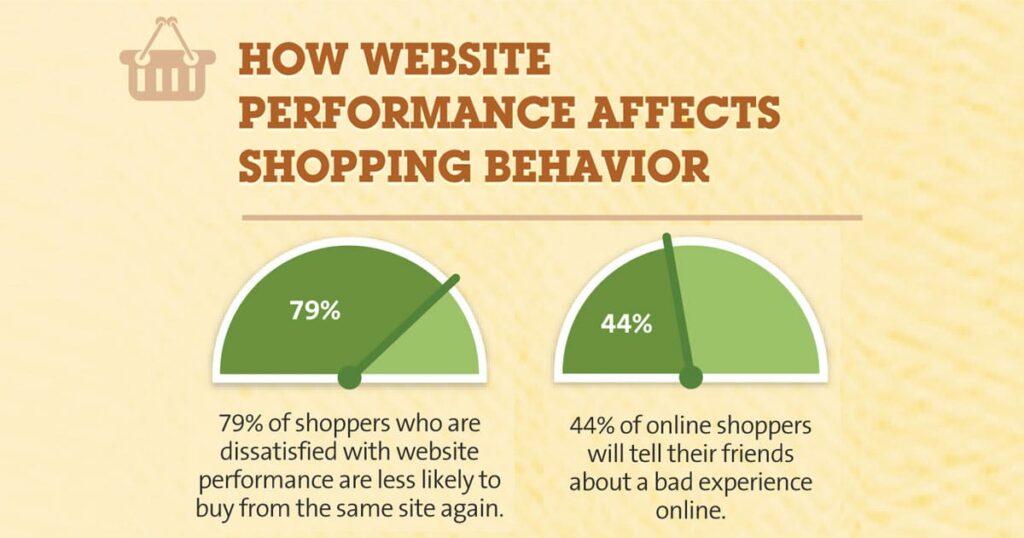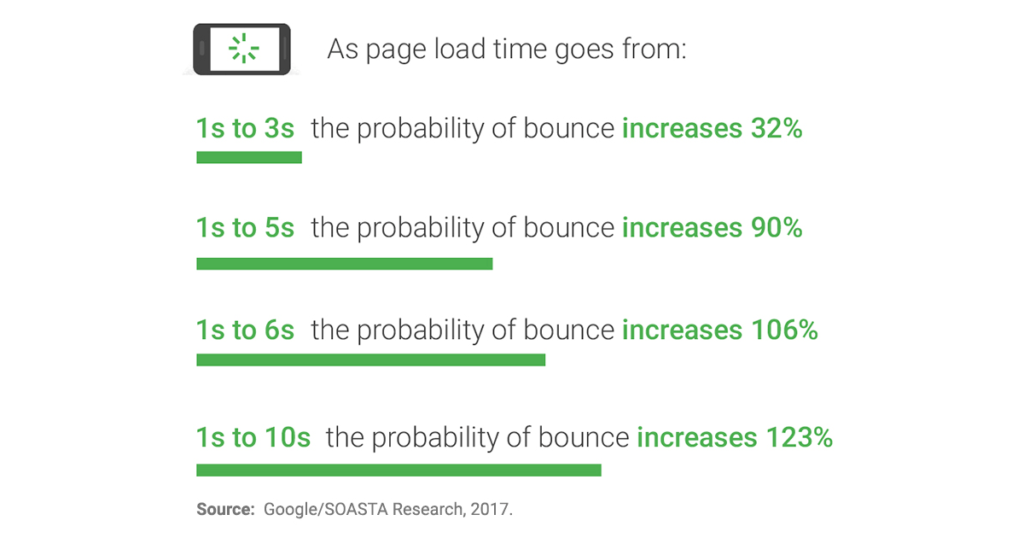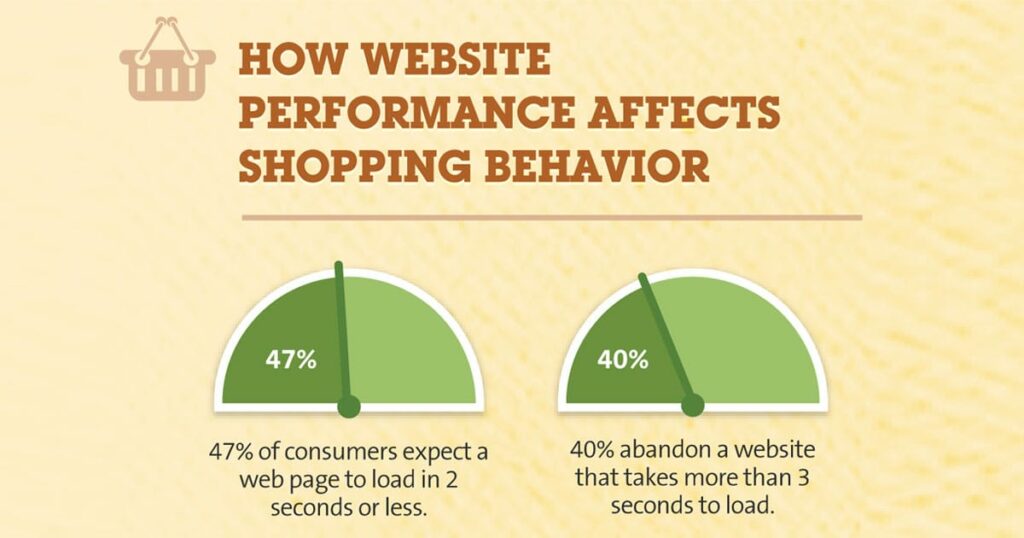Spend two minutes researching website performance optimisation and you’ll learn that website speed is important. This article outlines 3 reasons why.
3 Reasons why website speed is important
Many variables affect website speed (also known as page speed and load speed) and there are several different ways to measure website speed.
However, for this article we will take website speed to mean the time a user waits from clicking on a link to a website page to being able to interact with content on that page. After all, this is all that users are interested in.
So, let’s explore 3 reasons why website speed is important:
Fast loading websites give users a better experience
Giving your website visitors (users) a good experience on your website is an important factor in achieving your website goals.
Many things go into creating a good user experience (UX), but really all you have to do is give people what they’re looking for and give it to them fast.
How fast?
According to research by Portent, to improve your website goal conversions (the number of people purchasing, subscribing, contacting, donating etc on your website) you should aim for a 1 to 4 second load time.
We take a closer look at conversions later in this article.
Providing users with a good experience on your website benefits you in several ways:
- A fast website leads to more people staying on your site long enough to learn what you have to offer. To put that in technical terms, it reduces your bounce rate (below).
- A fast website helps build a perception that your business or nonprofit is professional and trustworthy. People may not be consciously aware of this perception, but they will be consciously aware of a perception that your business or nonprofit is unprofessional and unreliable when your website loads slowly.
- Your users may suffer through a slow-loading website long enough to get what they need, but they won’t be happy and may not come back. And to make things worse 44% of online shoppers will tell their friends about it.

You put a lot of effort into building your website, filling it with compelling content and attracting visitors. Allowing pages to load slowly wastes all that hard work.
Enjoy Lightning Fast Load Speeds
Our cloud hosting is secure, reliable and really fast. It’s also fully managed, so you can focus on your goals and leave the nerdy tech stuff to us.
Fast loading websites rank higher in search results
Search engine optimisation (SEO) is the practice of getting your website pages on the first page of search engine results when users search using keywords relevant to your organisation.
By ‘search engines’ we really mean Google, as Google handles over 90% of worldwide searches. And we specify page one because it receives 95% of all search traffic. If they can’t find what they’re looking for on page one people are more likely to change their search term than to venture onto page 2.
So, what does Google say about website speed?
First, website speed is a ranking factor, meaning it is part of Google’s algorithm for determining page positions in search results for a given keyword.
Google doesn’t provide information on the impact of website speed on ranking (Google doesn’t publish much about its algorithm at all), however, Google crawlers may visit slow websites less often and leave before indexing the entire site, further reducing opportunities to rank.
Website bounce rate may also be a Google ranking factor. Even if it isn’t, this figure provides a useful insight into how users interact with your site.
Bounce rate is the number of visitors leaving a web page without performing an action, such as clicking a link to another page, subscribing or purchasing.
Now, someone bouncing off a website hasn’t necessarily failed to find what they were looking for. However, in this case a high bounce rate suggests a need to improve on-site engagement, particularly around motivating and enabling people to take the actions needed to achieve the website goals (e.g. buy; subscribe; contact).
But a high bounce rate also suggests that users are leaving before arriving due to overly long load times.
Google has found that as page load time goes from one second to 10 seconds the probability of a mobile site visitor bouncing increases 123%.

Losing that many visitors provides strong motivation to improve your website speed.
Fast loading websites make more conversions
A website conversion happens when a user takes an action on your website, such as purchasing, subscribing or donating.
Transactional conversions are easier to achieve than ecommerce conversions – a user is far more likely to subscribe or complete a contact form than to make a purchase.
Nonetheless, website speed strongly affects transactional conversions. According to Portent:
- 1 second page load speed returns an average transactional conversion rate of 39%
- 2 seconds page load speed returns an average transactional conversion rate of 34%
- 3 seconds page load speed returns an average transactional conversion rate of 29%
- 6 seconds page load speed returns an average transactional conversion rate of 18%
But the need for speed is greater for ecommerce websites. Kissmetrics found that:
- 47% of consumers expect a web page to load in 2 seconds or less
- 40% abandon a website that takes more than 3 seconds to load

And Portent found that an ecommerce website that loads in one second has a conversion rate 2.5x higher than a site that loads in 5 seconds.
Further, in a Google Webmaster video (9:12 mins) Maile Ohye states that:
2 seconds is the threshold for ecommerce website acceptability
Slower than 2 seconds and you’re losing sales. However, Ms Ohye goes on to say:
At Google, we aim for under a half-second
Click, blink, loaded!
Website speed not the only important factor in website success
You now know why website speed is important but it’s not the only factor in website success. In this section we explore when to focus your attention on other things.
You see, optimising website performance means tackling many factors that together create a website your visitors and Google love.
Over-focussing on one factor means taking the focus off other factors, to the detriment of overall performance.
Website speed is one of around 200 factors Google uses to rank websites. The consensus amongst SEO experts is that although very slow sites are unlikely to rank high, reasonably fast sites can rank in competition with faster loading sites provided they meet other criteria.
So, once your website is loading at an acceptable speed, see what else needs your attention.
Two important factors are publishing great content and obtaining genuine backlinks from reputable websites.
Great content is content that solves your visitors’ problems and answers their questions. Great content doesn’t just make your potential customers, subscribers and donors happy, it also makes Google happy, and Google shows its pleasure by moving your pages up the search rankings.
Backlinks are links to your website from other websites. Backlinks tell Google that your website is accepted and approved by other website owners, which again moves you up the rankings.
A further important consideration is keeping your website in good running condition, especially by updating the programs on which it is built. Instigating a regular website maintenance routine is vitally important for fixing security threats, accessing new features and improving website performance, including load speed.
Why website speed is important conclusion
We’ve all heard the message, ‘speed kills’, but online is perhaps the only place where it should be taken as encouragement to go faster.
Increasing your website speed improves your users’ experience, moves you up the Google rankings and results in more conversions. But don’t neglect other important factors in achieving these outcomes, such as publishing great content and achieving backlinks from other websites. Lively now!
Enjoy Lightning Fast Load Speeds
Our cloud hosting is secure, reliable and really fast. It’s also fully managed, so you can focus on your goals and leave the nerdy tech stuff to us.